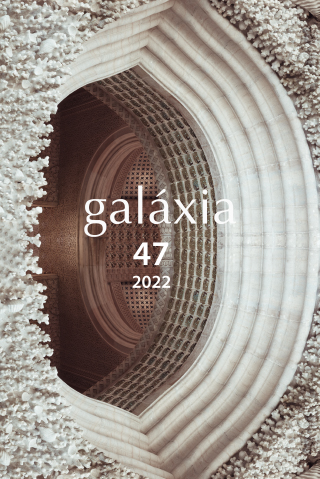Políticas da assombração
o populismo bolsonarista como produção de inquietantes duplos
Palabras clave:
populismo, bolsonarismo, redes sociais, Unheimliche, biopolíticaResumen
O artigo investiga as relações entre a gestão da opinião nas redes sociais e as artimanhas do populismo de ultradireita bolsonarista no Brasil. O ethos genealógico de inspiração nietzschiana direcionou a pesquisa empí- rica em torno dos sentidos da palavra liberdade tais como encontrados nas postagens do Twitter ao longo do dia 7 de Setembro de 2021, data de uma ruidosa manifestação — de cunho golpista — de apoio ao governo. Com base na análise dos dados produzidos pela técnica web scraping, identificamos uma importante tática bolsonarista: a produção de duplos de palavras atreladas tradicionalmente ao léxico democrático. Mais do que esvaziar o sentido de tais palavras, tal estratégia permite assombrá-las, inoculando estranhamento (das Unheimliche) em seus sentidos previamente cristalizados. Como efeito, insinua- -se uma deliberada produção de instabilidade e de insegurança, necessária à manipulação dos afetos tristes como vetor de uma biopolítica da população.
Citas
FERRAZ, Maria Cristina Franco; SAINT CLAIR, Ericson. “O idiota acima de todos: Momento Waldo – ascensão do fanatismo e esvaziamento do político”. In: Para além de Black Mirror: estilhaços distópicos do presente. São Paulo: N-1 Edições, 2020.
BAUER, M. “Análise de conteúdo clássica: uma revisão”. In: BAUER, M; GASKELL, G. (Org.). Pesquisa qualitativa com texto, imagem e som: um manual prático. Tradução de Pedrinho A. Guareschi. Petrópolis: Vozes, 2002.
BERGSON, H. Matière et mémoire. Paris: PUF, 1985.
DERRIDA, Jacques. L’écriture et la différence. Paris: Ed. Seuil, 1967.
CARVALHO, Louise Ferreira e FERRAZ, Maria Cristina Franco. “Autômatos, duplos e delírios atmosféricos da subjetividade moderna: O homem da areia, de Hoffmann”. In: Revista Estação Literária, número 27, p. 203-220. Disponível em
http://https://www.uel.br/revistas/uel/index.php/estacaoliteraria/article/view/41127/pdf
CRARY, Jonathan. 24/7: capitalismo e os fins do sono. São Paulo: Cosac Naify, 2014.
FOUCAULT, Michel. História da sexualidade, v.1: a vontade de saber. Tradução de Maria Thereza da Costa Albuquerque e J. A. Guilhon Albuquerque. 17 ed. Rio de Janeiro: Graal, 2006.
______. Segurança, território, população: curso dado no Collège de France (1977-1978). Tradução de Eduardo Brandão. São Paulo: Martins Fontes, 2008.
FREUD, Sigmund. “O inquietante”. In: Obras completas volume 14: História de uma neurose infantil (“O homem dos lobos”), Além do princípio do prazer e outros textos (1917-1920). Tradução de Paulo César de Souza. São Paulo: Companhia das Letras, 2010, p. 328-376.
HOFFMANN, E. T. A. O Homem da Areia. Tradução de Ary Quintella. Rio de Janeiro: Rocco Jovens Leitores, 2010.
______. Der Sandmann. Berlin: Aufbau, 1963.
KASTRUP, Virgínia. “O funcionamento da atenção no trabalho do cartógrafo”. In: PASSOS, Eduardo; KASTRUP, Virgínia; ESCÓSSIA, Liliana da. (org.). Pistas do método da cartografia: Pesquisa-intervenção e produção de subjetividade. Porto Alegre: Sulina, 2020.
NIETZSCHE, Friedrich. Genealogia da moral. Tradução Paulo César de Souza. São Paulo: Companhia das Letras, 1998.
______. Sämtliche Werke (KSA, 15 vol.). Berlim/Nova York: DTV/de Gruyter, 1988.
LAZZARATO, Maurizio. As revoluções do capitalismo. Rio de Janeiro: Civilização Brasileira, 2006.
______. Fascismo ou revolução: o neoliberalismo em chave estratégica. São Paulo: N-1, 2019.
LEMKE, Thomas. Biopolitics: an advanced introduction. Nova Iorque e Londres: New York University Press, 2011.
OLIVEIRA, Nicollas. R. ; PISA, P. S. ; COSTA, B. ; ANDREONI L., MARTIN E. ; MORAES, I. M. ; DIOGO MATTOS, M. F. “Processamento de Linguagem Natural para Identificação de Notícias Falsas em Redes Sociais: Ferramentas, Tendências e Desafios”. In: VIEGAS, Eduardo. (Org.). Minicursos do SBSeg 2020. 1ed.Porto Alegre: SBC, 2020
RABINOW, Paul. “Sujeito e governamentalidade: elementos do trabalho de Michel Foucault”. In: Antropologia da razão. Rio de Janeiro: Relume Dumará, 2002.
RABINOW, Paul; ROSE, Nikolas. “Biopower today”. In: BioSocieties, v. 1. Londres: London School of Economics and Political Science, 2006.
Disponível em: https://link.springer.com/content/pdf/10.1017/S1745855206040014.pdf
Acesso em 04 out. 2021.
TARDE, Gabriel. A opinião e as massas. Tradução de Eduardo Brandão. 2 ed. São Paulo: Martins Fontes, 2005.
Descargas
Publicado
Cómo citar
Número
Sección
Licencia
Derechos de autor 2022 Galáxia. Revista do Programa de Pós-Graduação em Comunicação e Semiótica

Esta obra está bajo una licencia internacional Creative Commons Atribución 4.0.
Cedo a la revista Galaxia los derechos de autor para la publicación de mi artículo y consultaré al editor científico de la revista caso quiera republicarlo más adelante en un libro.



 Este obra está licenciada com uma Licença
Este obra está licenciada com uma Licença 